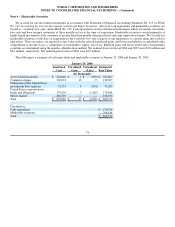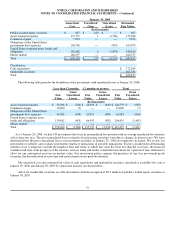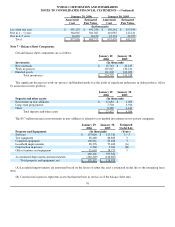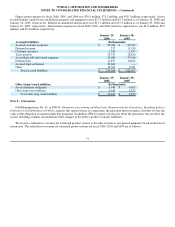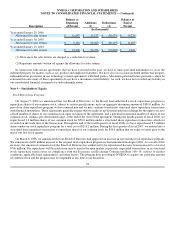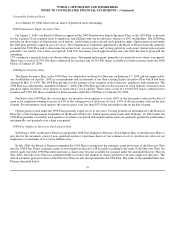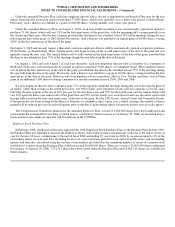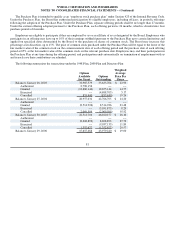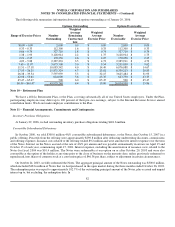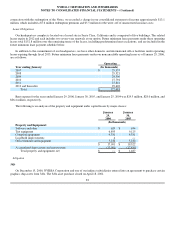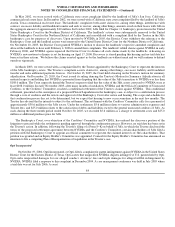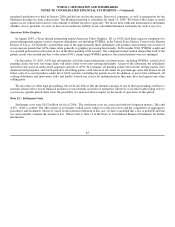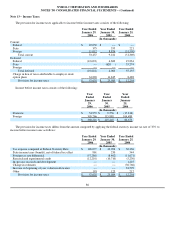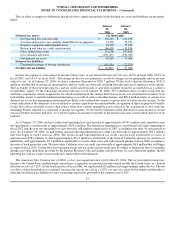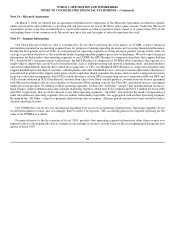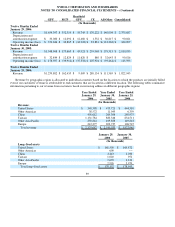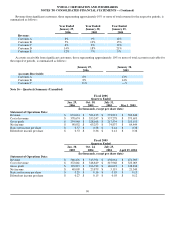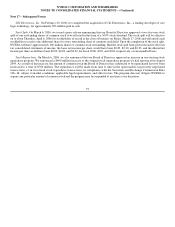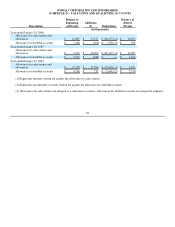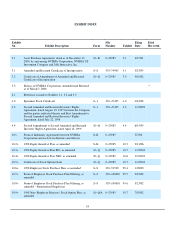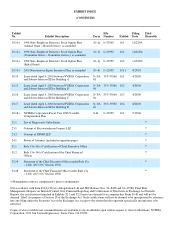NVIDIA 2006 Annual Report Download - page 92
Download and view the complete annual report
Please find page 92 of the 2006 NVIDIA annual report below. You can navigate through the pages in the report by either clicking on the pages listed below, or by using the keyword search tool below to find specific information within the annual report.
NVIDIA CORPORATION AND SUBSIDIARIES
NOTES TO CONSOLIDATED FINANCIAL STATEMENTS − (Continued)
In May 2002, we were served with a California state court complaint filed by the landlord of 3dfx's San Jose, California
commercial real estate lease. In December 2002, we were served with a California state court complaint filed by the landlord of 3dfx's
Austin, Texas commercial real estate lease. The landlords' complaints both assert claims for, among other things, interference with
contract, successor liability and fraudulent transfer and seek to recover, among other things, amounts owed on their leases with 3dfx in
the aggregate amount of approximately $10 million. In October 2002, 3dfx filed for Chapter 11 bankruptcy protection in the United
States Bankruptcy Court for the Northern District of California. The landlords' actions were subsequently removed to the United
States Bankruptcy Court for the Northern District of California and consolidated with a complaint filed by the Trustee in the 3dfx
bankruptcy case for purposes of discovery. Upon motion by NVIDIA in 2005, the District Court withdrew the reference to the
Bankruptcy Court and the landlord actions were removed to the United States District Court for the Northern District of California.
On November 10, 2005, the District Court granted NVIDIA's motion to dismiss the landlords' respective amended complaints and
allowed the landlords to have until February 4, 2006 to amend their complaints. The landlords' refiled claims against NVIDIA in early
February 2006, and NVIDIA again requested the District Court to dismiss all such claims made by the landlords. A hearing on
NVIDIA's new motions to dismiss is set for hearing on April 17, 2006. Discovery is stayed pending this hearing and no trial date has
been set in these actions. We believe the claims asserted against us by the landlords are without merit and we will continue to defend
ourselves vigorously.
In March 2003, we were served with a complaint filed by the Trustee appointed by the Bankruptcy Court to represent the interests
of the 3dfx bankruptcy estate. The Trustee's complaint asserts claims for, among other things, successor liability and fraudulent
transfer and seeks additional payments from us. On October 13, 2005, the Court held a hearing on the Trustee's motion for summary
adjudication. On December 23, 2005, the Court issued its ruling denying the Trustee's Motion for Summary Adjudication in all
material respects and holding that NVIDIA is prevented from disputing that the value of the 3dfx transaction to NVIDIA was less than
$108.0 million. The Court expressly denied the Trustee's request to find that the value of the 3dfx assets conveyed to NVIDIA were at
least $108.0 million. In early November 2005, after many months of mediation, NVIDIA and the Official Committee of Unsecured
Creditors, or the Creditors' Committee, reached a conditional settlement of the Trustee's claims against NVIDIA. This conditional
settlement, presented as the centerpiece of a proposed Plan of Liquidation in the bankruptcy case, is subject to a confirmation process
through a vote of creditors and the review and approval of the Bankruptcy Court after notice and hearing. The scope and schedule for
that confirmation process has yet to be determined, but we expect that hearing to now occur sometime in the next few months. The
Trustee has advised that he intends to object to the settlement. The settlement with the Creditors' Committee calls for a payment of
approximately $30.6 million to the 3dfx estate. Under the settlement, $5.6 million relates to various administrative expenses and
Trustee fees, and $25.0 million relates to the satisfaction of debts and liabilities owed to the general unsecured creditors of 3dfx. As
such, during the three month period ended October 30, 2005, we recorded $5.6 million as a charge to settlement costs and $25.0
million as additional purchase price for 3dfx.
The Bankruptcy Court, over objection of the Creditors' Committee and NVIDIA, has ordered the discovery portion of the
litigation to proceed while the settlement is pending approval through the confirmation process. However, no trial date has been set in
the Trustee's action. In addition, following the Trustee's filing of a Form 8−K on behalf of 3dfx, in which the Trustee disclosed the
terms of the proposed settlement agreement between NVIDIA and the Creditor's Committee, certain shareholders of 3dfx filed a
petition with the Bankruptcy Court to appoint an official committee to represent the claimed interest's of 3dfx shareholders. That
petition was granted and an Equity Holder's Committee was appointed. Counsel for the Equity Holder's Committee has announced an
intention to file a competing Plan of Reorganization or Liquidation in the Trustee's case.
Opti Incorporated
On October 19, 2004, Opti Incorporated, or Opti, filed a complaint for patent infringement against NVIDIA in the United States
District Court for the Eastern District of Texas. Opti asserts that unspecified NVIDIA chipsets infringe five U.S. patents held by Opti.
Opti seeks unspecified damages for our alleged conduct, attorneys' fees and triple damages for alleged willful infringement by
NVIDIA. NVIDIA filed a response to this complaint in December 2004. A case management conference was held in July 2005 where
a trial date was set for July 2006. A court
84


